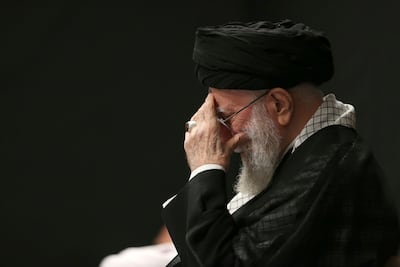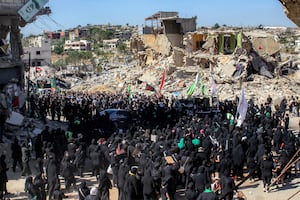Iran’s supreme leader Ayatollah Ali Khamenei made his first public appearance since the 12-day war between Israel and Iran, attending a mourning ceremony on the eve of Ashura.
Mr Khamenei was seen in a video broadcasted by state media greeting people and being cheered at in a mosque as worshippers marked the annual Shiite anniversary that marks the death of Imam Hussein, the grandson of the Prophet Mohammed.
Mr Khamenei, 86, was dressed in black as the crowd chanted “The blood in our veins for our leader!".
There were no reports on any public statements made. Iranian officials, such as the parliament speaker, were present. Such events are always held under heavy security.
Mr Khamenei, who has been in power since 1989, was seen speaking last week in a pre-recorded video, but had not been seen in public since before Israel began its war on Iran with a wave of surprise air strikes on June 13.
His last public appearance was two days before that, when he met members of parliament.
Israel made the decision to attack Iran, after years of hostility and tension with Tehran, with the aim of preventing it from developing a nuclear weapon. Iran has always said it was developing its programme for peaceful purposes.
The US also intervened into the war by bombing three key Iranian nuclear sites.
US President Donald Trump sent warnings through social media to Mr Khamenei that Washington is aware of where he was but had no plans to kill him, “at least for now”.
At least 900 people have been killed in the war with Israel, Iran has said, including its top nuclear scientists and military leaders, as well as thousands injured.
The country also confirmed serious damage to its nuclear sites, and has denied access to the sites for inspectors with the UN nuclear watchdog.
However, it remains unclear just how badly damaged the nuclear sites are, whether any enriched uranium or centrifuges had been moved before the attacks, and whether Tehran still would be willing to continue negotiations with the US over its nuclear programme.
In response to the Israeli attacks, Iran fired more than 550 ballistic missiles at Israel, most of them intercepted, killing 28 people and causing damage in many areas.
SERIE A FIXTURES
Friday Sassuolo v Torino (Kick-off 10.45pm UAE)
Saturday Atalanta v Sampdoria (5pm),
Genoa v Inter Milan (8pm),
Lazio v Bologna (10.45pm)
Sunday Cagliari v Crotone (3.30pm)
Benevento v Napoli (6pm)
Parma v Spezia (6pm)
Fiorentina v Udinese (9pm)
Juventus v Hellas Verona (11.45pm)
Monday AC Milan v AS Roma (11.45pm)
%E2%80%98FSO%20Safer%E2%80%99%20-%20a%20ticking%20bomb
%3Cp%3EThe%20%3Cem%3ESafer%3C%2Fem%3E%20has%20been%20moored%20off%20the%20Yemeni%20coast%20of%20Ras%20Issa%20since%201988.%3Cbr%3EThe%20Houthis%20have%20been%20blockading%20UN%20efforts%20to%20inspect%20and%20maintain%20the%20vessel%20since%202015%2C%20when%20the%20war%20between%20the%20group%20and%20the%20Yemen%20government%2C%20backed%20by%20the%20Saudi-led%20coalition%20began.%3Cbr%3ESince%20then%2C%20a%20handful%20of%20people%20acting%20as%20a%20%3Ca%20href%3D%22https%3A%2F%2Fwww.google.ae%2Furl%3Fsa%3Dt%26rct%3Dj%26q%3D%26esrc%3Ds%26source%3Dweb%26cd%3D%26ved%3D2ahUKEwiw2OfUuKr4AhVBuKQKHTTzB7cQFnoECB4QAQ%26url%3Dhttps%253A%252F%252Fwww.thenationalnews.com%252Fworld%252Fmena%252Fyemen-s-floating-bomb-tanker-millions-kept-safe-by-skeleton-crew-1.1104713%26usg%3DAOvVaw0t9FPiRsx7zK7aEYgc65Ad%22%20target%3D%22_self%22%3Eskeleton%20crew%3C%2Fa%3E%2C%20have%20performed%20rudimentary%20maintenance%20work%20to%20keep%20the%20%3Cem%3ESafer%3C%2Fem%3E%20intact.%3Cbr%3EThe%20%3Cem%3ESafer%3C%2Fem%3E%20is%20connected%20to%20a%20pipeline%20from%20the%20oil-rich%20city%20of%20Marib%2C%20and%20was%20once%20a%20hub%20for%20the%20storage%20and%20export%20of%20crude%20oil.%26nbsp%3B%3C%2Fp%3E%0A%3Cp%3EThe%20%3Cem%3ESafer%3C%2Fem%3E%E2%80%99s%20environmental%20and%20humanitarian%20impact%20may%20extend%20well%20beyond%20Yemen%2C%20experts%20believe%2C%20into%20the%20surrounding%20waters%20of%20Saudi%20Arabia%2C%20Djibouti%20and%20Eritrea%2C%20impacting%20marine-life%20and%20vital%20infrastructure%20like%20desalination%20plans%20and%20fishing%20ports.%C2%A0%3C%2Fp%3E%0A
WHAT IS A BLACK HOLE?
1. Black holes are objects whose gravity is so strong not even light can escape their pull
2. They can be created when massive stars collapse under their own weight
3. Large black holes can also be formed when smaller ones collide and merge
4. The biggest black holes lurk at the centre of many galaxies, including our own
5. Astronomers believe that when the universe was very young, black holes affected how galaxies formed
Biography
Her family: She has four sons, aged 29, 27, 25 and 24 and is a grandmother-of-nine
Favourite book: Flashes of Thought by Sheikh Mohammed bin Rashid
Favourite drink: Water
Her hobbies: Reading and volunteer work
Favourite music: Classical music
Her motto: I don't wait, I initiate
'Nope'
%3Cp%3E%3Cstrong%3EDirector%3A%3C%2Fstrong%3E%20Jordan%20Peele%0D%3Cbr%3E%3Cstrong%3EStars%3A%3C%2Fstrong%3E%20Daniel%20Kaluuya%2C%20Keke%20Palmer%2C%20Brandon%20Perea%2C%20Steven%20Yeun%0D%3Cbr%3E%3Cstrong%3ERating%3A%3C%2Fstrong%3E%203.5%2F5%3C%2Fp%3E%0A
The specs
Engine: 5.0-litre V8
Power: 480hp at 7,250rpm
Torque: 566Nm at 4,600rpm
Transmission: 10-speed auto
Fuel consumption: L/100km
Price: Dh306,495
On sale: now
Countries offering golden visas
UK
Innovator Founder Visa is aimed at those who can demonstrate relevant experience in business and sufficient investment funds to set up and scale up a new business in the UK. It offers permanent residence after three years.
Germany
Investing or establishing a business in Germany offers you a residence permit, which eventually leads to citizenship. The investment must meet an economic need and you have to have lived in Germany for five years to become a citizen.
Italy
The scheme is designed for foreign investors committed to making a significant contribution to the economy. Requires a minimum investment of €250,000 which can rise to €2 million.
Switzerland
Residence Programme offers residence to applicants and their families through economic contributions. The applicant must agree to pay an annual lump sum in tax.
Canada
Start-Up Visa Programme allows foreign entrepreneurs the opportunity to create a business in Canada and apply for permanent residence.
How has net migration to UK changed?
The figure was broadly flat immediately before the Covid-19 pandemic, standing at 216,000 in the year to June 2018 and 224,000 in the year to June 2019.
It then dropped to an estimated 111,000 in the year to June 2020 when restrictions introduced during the pandemic limited travel and movement.
The total rose to 254,000 in the year to June 2021, followed by steep jumps to 634,000 in the year to June 2022 and 906,000 in the year to June 2023.
The latest available figure of 728,000 for the 12 months to June 2024 suggests levels are starting to decrease.
BLACK%20ADAM
%3Cp%3E%3Cstrong%3EDirector%3A%3C%2Fstrong%3E%20Jaume%20Collet-Serra%3C%2Fp%3E%0A%3Cp%3E%3Cstrong%3EStars%3A%3C%2Fstrong%3E%20Dwayne%20Johnson%2C%20Sarah%20Shahi%2C%20Viola%20Davis%2C%20Pierce%20Brosnan%3C%2Fp%3E%0A%3Cp%3E%3Cstrong%3ERating%3A%20%3C%2Fstrong%3E3%2F5%3C%2Fp%3E%0A
Skoda Superb Specs
Engine: 2-litre TSI petrol
Power: 190hp
Torque: 320Nm
Price: From Dh147,000
Available: Now
ABU DHABI ORDER OF PLAY
Starting at 10am:
Daria Kasatkina v Qiang Wang
Veronika Kudermetova v Annet Kontaveit (10)
Maria Sakkari (9) v Anastasia Potapova
Anastasia Pavlyuchenkova v Ons Jabeur (15)
Donna Vekic (16) v Bernarda Pera
Ekaterina Alexandrova v Zarina Diyas
SPECS
%3Cp%3E%3Cstrong%3EEngine%3A%3C%2Fstrong%3E%20Dual%20electric%20motors%20with%20102kW%20battery%20pack%3C%2Fp%3E%0A%3Cp%3E%3Cstrong%3EPower%3A%20%3C%2Fstrong%3E570hp%3C%2Fp%3E%0A%3Cp%3E%3Cstrong%3ETorque%3A%3C%2Fstrong%3E%20890Nm%3C%2Fp%3E%0A%3Cp%3E%3Cstrong%3ERange%3A%3C%2Fstrong%3E%20Up%20to%20428km%3C%2Fp%3E%0A%3Cp%3E%3Cstrong%3EOn%20sale%3A%3C%2Fstrong%3E%20Now%3C%2Fp%3E%0A%3Cp%3E%3Cstrong%3EPrice%3A%20%3C%2Fstrong%3EFrom%20Dh1%2C700%2C000%3C%2Fp%3E%0A
Tamkeen's offering
- Option 1: 70% in year 1, 50% in year 2, 30% in year 3
- Option 2: 50% across three years
- Option 3: 30% across five years
The burning issue
The internal combustion engine is facing a watershed moment – major manufacturer Volvo is to stop producing petroleum-powered vehicles by 2021 and countries in Europe, including the UK, have vowed to ban their sale before 2040. The National takes a look at the story of one of the most successful technologies of the last 100 years and how it has impacted life in the UAE.
Read part four: an affection for classic cars lives on
Read part three: the age of the electric vehicle begins
Read part one: how cars came to the UAE
Dust and sand storms compared
Sand storm
- Particle size: Larger, heavier sand grains
- Visibility: Often dramatic with thick "walls" of sand
- Duration: Short-lived, typically localised
- Travel distance: Limited
- Source: Open desert areas with strong winds
Dust storm
- Particle size: Much finer, lightweight particles
- Visibility: Hazy skies but less intense
- Duration: Can linger for days
- Travel distance: Long-range, up to thousands of kilometres
- Source: Can be carried from distant regions
Timeline
1947
Ferrari’s road-car company is formed and its first badged car, the 125 S, rolls off the assembly line
1962
250 GTO is unveiled
1969
Fiat becomes a Ferrari shareholder, acquiring 50 per cent of the company
1972
The Fiorano circuit, Ferrari’s racetrack for development and testing, opens
1976
First automatic Ferrari, the 400 Automatic, is made
1987
F40 launched
1988
Enzo Ferrari dies; Fiat expands its stake in the company to 90 per cent
2002
The Enzo model is announced
2010
Ferrari World opens in Abu Dhabi
2011
First four-wheel drive Ferrari, the FF, is unveiled
2013
LaFerrari, the first Ferrari hybrid, arrives
2014
Fiat Chrysler announces the split of Ferrari from the parent company
2015
Ferrari launches on Wall Street
2017
812 Superfast unveiled; Ferrari celebrates its 70th anniversary
The specs: 2018 Nissan Patrol Nismo
Price: base / as tested: Dh382,000
Engine: 5.6-litre V8
Gearbox: Seven-speed automatic
Power: 428hp @ 5,800rpm
Torque: 560Nm @ 3,600rpm
Fuel economy, combined: 12.7L / 100km
'The Batman'
Stars:Robert Pattinson
Director:Matt Reeves
Rating: 5/5


